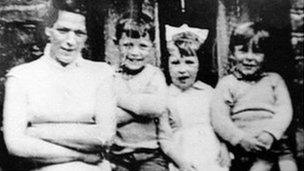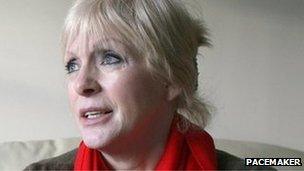Jean McConville's family welcome IRA Boston ruling
- Published

Jean McConville, left, was abducted and murdered in 1972
The family of Jean McConville, murdered and secretly buried by the IRA 40 years ago, have welcomed a US appeal court ruling that an interview with a former IRA bomber should be handed to police.
In the Boston College recording, Dolours Price allegedly discusses Mrs McConville's death.
She spoke on the strict understanding that the interview would be kept secret until after her death.
But a US Appeal Court ruled a tape transcript should be handed to police.
Detectives in the Police Service of Northern Ireland (PSNI) investigating the murder of Mrs McConville, one of the so-called "Disappeared", requested the transcript.
The Disappeared were people abducted, murdered and secretly buried by the IRA. In 1972, Jean McConville, a mother of 10, was taken from her Divis Street home in Belfast and was shot and buried near a County Louth beach. Her body was found at Shelling Hill beach in 2003.
Speaking on BBC NI's Good Morning Ulster on Monday, Michael McConville, Jean's son, welcomed the court ruling.
He said he wanted those involved in his mother's murder to be "named and shamed".
"I am not really worried about prosecution but the people that murdered my mother, I would like them to be named and shamed," he said.
"We get to know who the people were who murdered my mother. If something happens to them that will be good enough for our family."
The material is expected to be handed over next month.
The interviews with former republicans and loyalists involved in the Troubles are part of the Boston College Belfast Project which began in 2001 and lasted five years.
They were conducted by former IRA member turned academic Anthony McIntyre and journalist Ed Moloney. They have argued against any disclosure of the material.
They stressed that those interviewed from both the Catholic and Protestant sides of the conflict were promised confidentiality until their deaths and argue the release could harm the peace process.
They plan to challenge the ruling and have the case re-heard. Mr McIntyre's solicitor, Kevin Winters, said legal action was also being taken in Northern Ireland, on the grounds that his client's human rights may be breached if Boston College hands the material to the police.
"He makes the case that he feels threatened and his wife and his family are under threat.
"The ruling on Friday night, if it crystallises in the transfer of material to police, he says will escalate the threat and that is something we have to be mindful of," said Mr Winters.
It is expected an American court will make a decision in the next few weeks, on whether further interviews with seven IRA members as part of the Boston College project can also be given to the PSNI.
Despite the ruling, it is by no means certain these tapes will end up in the hands of the PSNI.
There are still three outstanding legal processes that those opposed to the release of the tapes are pursuing. It is unlikely that the tapes could be released before these are exhausted.
Boston College has its own appeal over the seven other IRA tapes; the researchers will continue the appeals processes in America and Mr McIntyre has requested a judicial review in Belfast.
Dolours Price participated in the car bombing of the Old Bailey courthouse in London on 8 March 1973. The explosion injured more than 200 people.
After speaking to Boston College, Ms Price later gave an interview to a newspaper journalist, in which she admitted that she had taken part in the Belfast Project.
In that interview she allegedly claimed to have been the person who drove Mrs McConville, to her death in 1972.

Dolours Price told a newspaper journalist she had taken part in the Belfast Project
The PSNI said it had re-opened the inquiry into Mrs McConville's murder and was seeking the transcripts on that basis.
Initial court decisions in the United States accepted the PSNI's interest as legitimate, and the tapes of the Price interview and seven others deemed pertinent to an investigation into the Disappeared were placed in the hands of the US federal court.
Testimonies
<link> <caption>In her ruling</caption> <altText>In her ruling</altText> <url href="http://www.ca1.uscourts.gov/cgi-bin/getopn.pl?OPINION=11-2511P.01A" platform="highweb"/> </link> , chief Appeal Court Judge Sandra Lynch said the researchers could not state a claim that they have rights under a legal-assistance treaty between the United States and the United Kingdom.
She also acknowledged that while the researchers claimed an academic research privilege under their constitutional rights to freedom of speech, "the choice to investigate criminal activity belongs to the government and is not subject to veto by academic researchers."
The Belfast Project involved academics, historians and journalists conducting interviews with former republicans and loyalists about their activities during the Troubles.
The researchers have argued that releasing the documents could risk the lives of people who gave testimonies.
- Published8 July 2012
- Published29 January 2012
- Published4 April 2012
- Published4 April 2012
- Published24 January 2012